Ethics: John Stuart Mill's Utilitarianism, BSA 1-2, Group 7
VerifiedAdded on 2022/05/16
|12
|1532
|44
Homework Assignment
AI Summary
This document is a student's analysis of John Stuart Mill's Utilitarianism, focusing on key concepts such as the Greatest Happiness Principle, rule utilitarianism, and the distinction between higher and lower pleasures. The paper begins with an overview of Mill's life and his influential essay on utilitarianism, defining the philosophy and addressing common misconceptions. It then breaks down Mill's arguments, including the role of pleasure, the importance of quality over quantity in pleasures, and the connection between utilitarianism and natural human sentiments. The analysis further explores the Greatest Happiness Principle, emphasizing that actions are right in proportion to their promotion of happiness, and discusses rule utilitarianism. The document concludes with an application of Mill's ideas, identifying and explaining higher and lower forms of pleasure. The paper includes references to relevant sources to support the analysis.
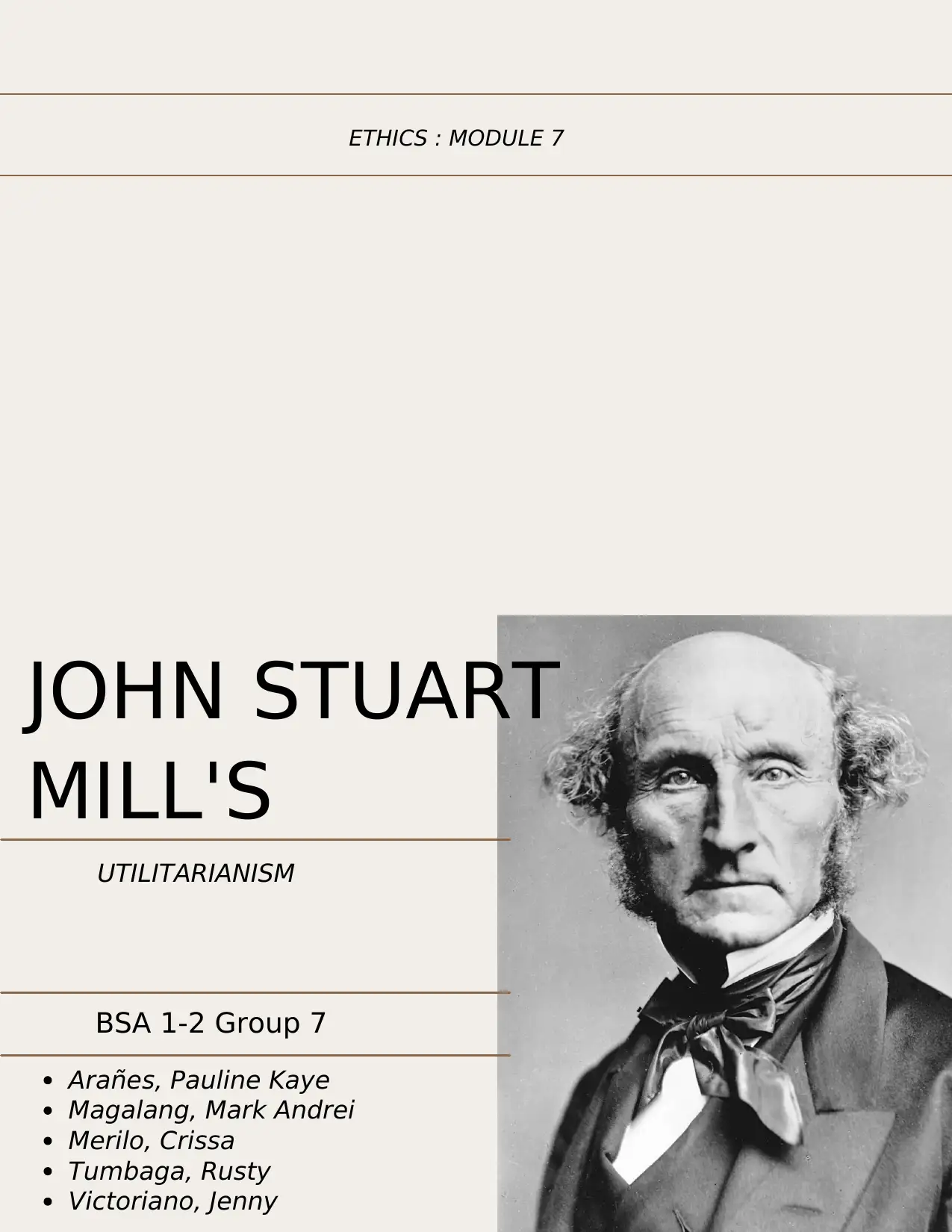
JOHN STUART
MILL'S
UTILITARIANISM
BSA 1-2 Group 7
ETHICS : MODULE 7
Arañes, Pauline Kaye
Magalang, Mark Andrei
Merilo, Crissa
Tumbaga, Rusty
Victoriano, Jenny
MILL'S
UTILITARIANISM
BSA 1-2 Group 7
ETHICS : MODULE 7
Arañes, Pauline Kaye
Magalang, Mark Andrei
Merilo, Crissa
Tumbaga, Rusty
Victoriano, Jenny
Paraphrase This Document
Need a fresh take? Get an instant paraphrase of this document with our AI Paraphraser
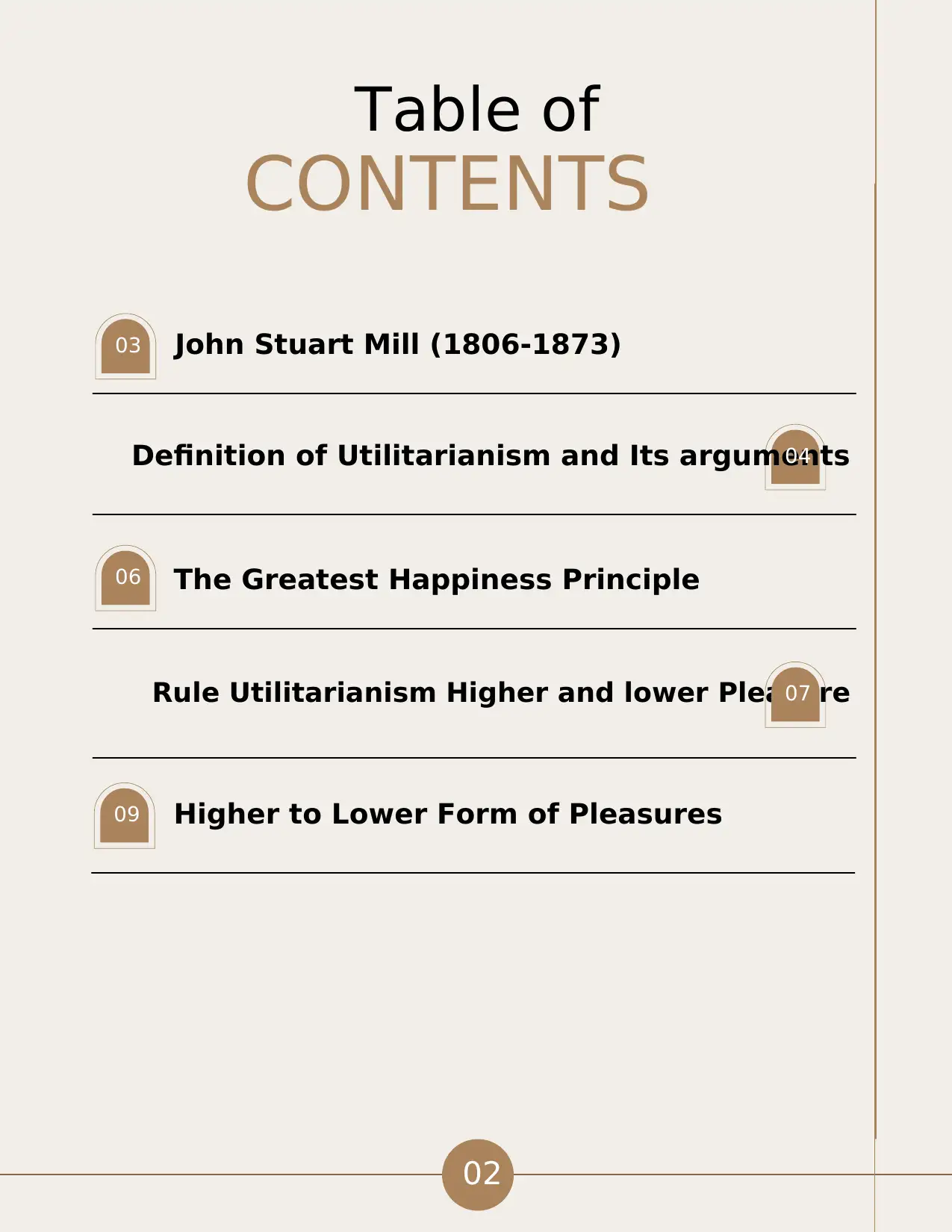
Table of
CONTENTS
02
Rule Utilitarianism Higher and lower Pleasure
John Stuart Mill (1806-1873)03
Definition of Utilitarianism and Its arguments04
The Greatest Happiness Principle06
07
Higher to Lower Form of Pleasures09
CONTENTS
02
Rule Utilitarianism Higher and lower Pleasure
John Stuart Mill (1806-1873)03
Definition of Utilitarianism and Its arguments04
The Greatest Happiness Principle06
07
Higher to Lower Form of Pleasures09
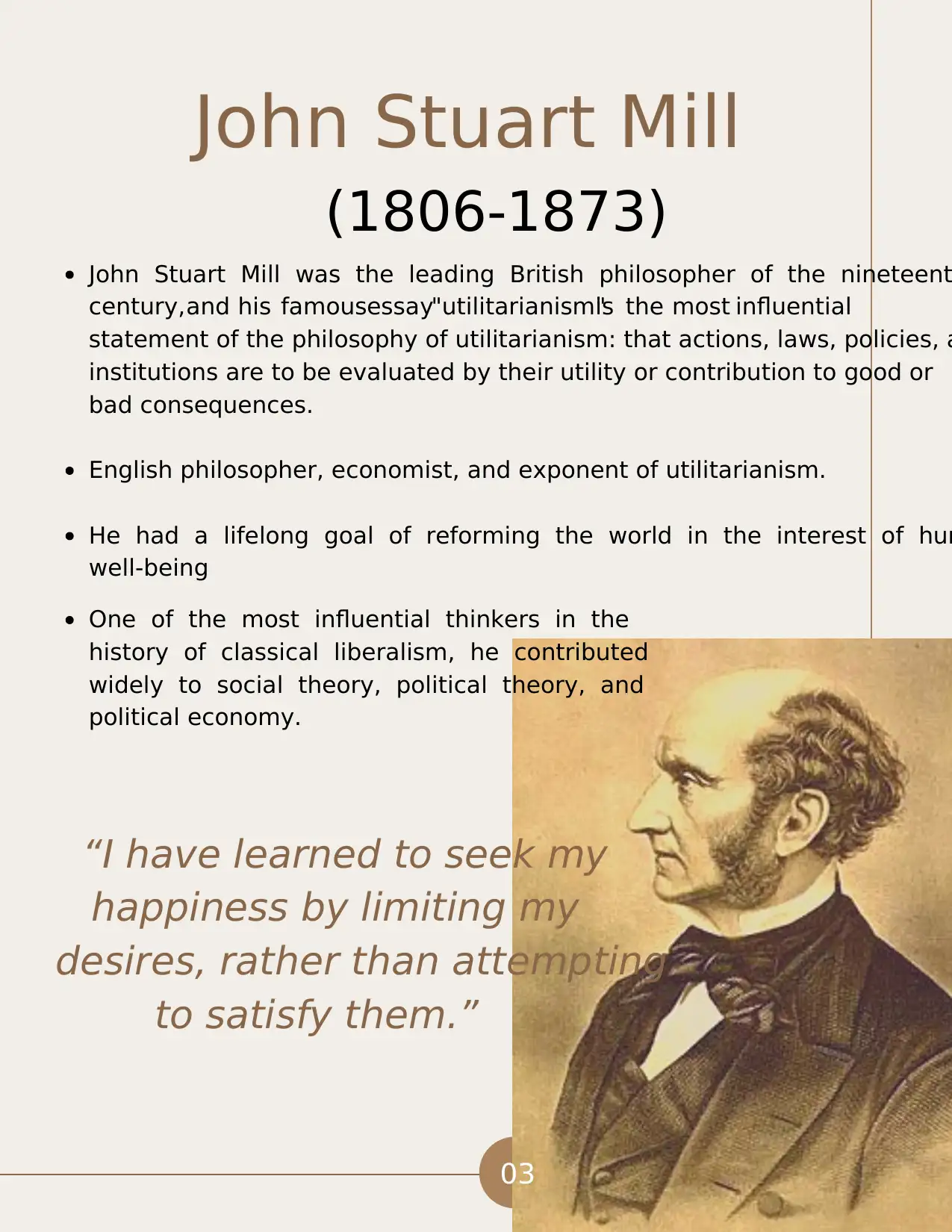
03
John Stuart Mill was the leading British philosopher of the nineteent
century, and his famousessay"utilitarianism"is the most influential
statement of the philosophy of utilitarianism: that actions, laws, policies, a
institutions are to be evaluated by their utility or contribution to good or
bad consequences.
English philosopher, economist, and exponent of utilitarianism.
He had a lifelong goal of reforming the world in the interest of hum
well-being
One of the most influential thinkers in the
history of classical liberalism, he contributed
widely to social theory, political theory, and
political economy.
“I have learned to seek my
happiness by limiting my
desires, rather than attempting
to satisfy them.”
John Stuart Mill
(1806-1873)
John Stuart Mill was the leading British philosopher of the nineteent
century, and his famousessay"utilitarianism"is the most influential
statement of the philosophy of utilitarianism: that actions, laws, policies, a
institutions are to be evaluated by their utility or contribution to good or
bad consequences.
English philosopher, economist, and exponent of utilitarianism.
He had a lifelong goal of reforming the world in the interest of hum
well-being
One of the most influential thinkers in the
history of classical liberalism, he contributed
widely to social theory, political theory, and
political economy.
“I have learned to seek my
happiness by limiting my
desires, rather than attempting
to satisfy them.”
John Stuart Mill
(1806-1873)
⊘ This is a preview!⊘
Do you want full access?
Subscribe today to unlock all pages.

Trusted by 1+ million students worldwide
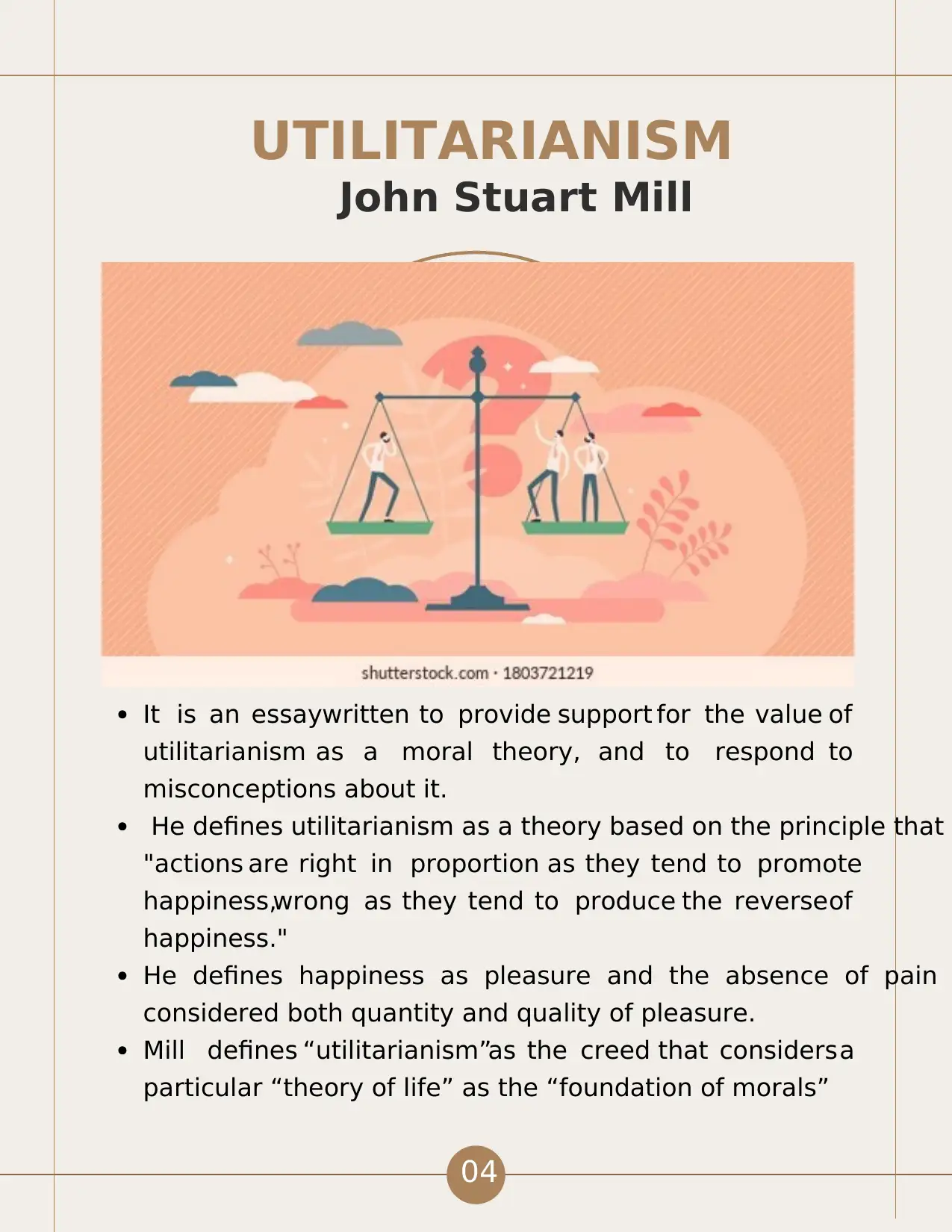
04
UTILITARIANISM
John Stuart Mill
It is an essaywritten to provide support for the value of
utilitarianism as a moral theory, and to respond to
misconceptions about it.
He defines utilitarianism as a theory based on the principle that
"actions are right in proportion as they tend to promote
happiness,wrong as they tend to produce the reverseof
happiness."
He defines happiness as pleasure and the absence of pain
considered both quantity and quality of pleasure.
Mill defines “utilitarianism”as the creed that considers a
particular “theory of life” as the “foundation of morals”
UTILITARIANISM
John Stuart Mill
It is an essaywritten to provide support for the value of
utilitarianism as a moral theory, and to respond to
misconceptions about it.
He defines utilitarianism as a theory based on the principle that
"actions are right in proportion as they tend to promote
happiness,wrong as they tend to produce the reverseof
happiness."
He defines happiness as pleasure and the absence of pain
considered both quantity and quality of pleasure.
Mill defines “utilitarianism”as the creed that considers a
particular “theory of life” as the “foundation of morals”
Paraphrase This Document
Need a fresh take? Get an instant paraphrase of this document with our AI Paraphraser
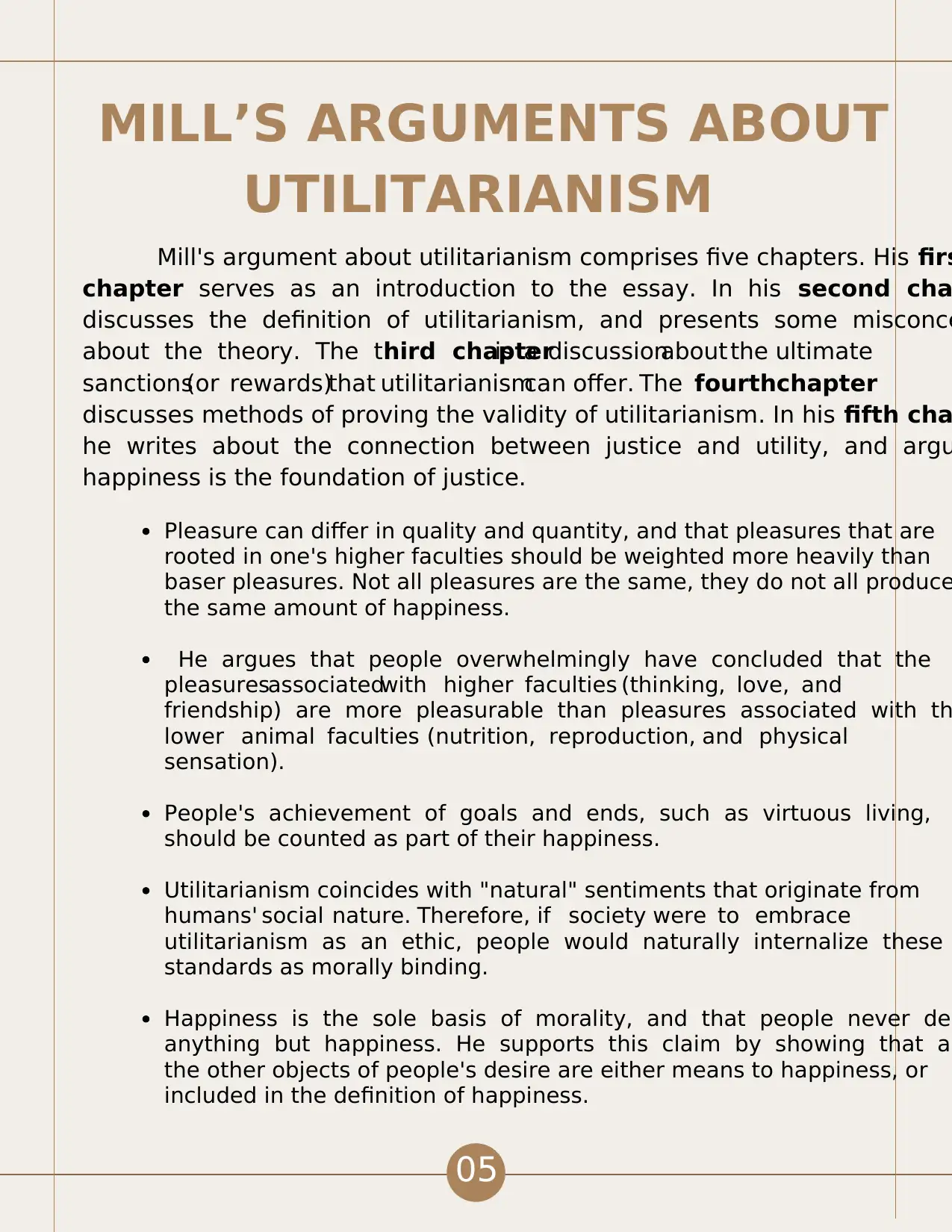
05
MILL’S ARGUMENTS ABOUT
UTILITARIANISM
Mill's argument about utilitarianism comprises five chapters. His firs
chapter serves as an introduction to the essay. In his second cha
discusses the definition of utilitarianism, and presents some misconce
about the theory. The third chapteris a discussionabout the ultimate
sanctions(or rewards)that utilitarianismcan offer. The fourthchapter
discusses methods of proving the validity of utilitarianism. In his fifth cha
he writes about the connection between justice and utility, and argu
happiness is the foundation of justice.
Pleasure can differ in quality and quantity, and that pleasures that are
rooted in one's higher faculties should be weighted more heavily than
baser pleasures. Not all pleasures are the same, they do not all produce
the same amount of happiness.
He argues that people overwhelmingly have concluded that the
pleasuresassociatedwith higher faculties (thinking, love, and
friendship) are more pleasurable than pleasures associated with th
lower animal faculties (nutrition, reproduction, and physical
sensation).
People's achievement of goals and ends, such as virtuous living,
should be counted as part of their happiness.
Utilitarianism coincides with "natural" sentiments that originate from
humans' social nature. Therefore, if society were to embrace
utilitarianism as an ethic, people would naturally internalize these
standards as morally binding.
Happiness is the sole basis of morality, and that people never des
anything but happiness. He supports this claim by showing that al
the other objects of people's desire are either means to happiness, or
included in the definition of happiness.
MILL’S ARGUMENTS ABOUT
UTILITARIANISM
Mill's argument about utilitarianism comprises five chapters. His firs
chapter serves as an introduction to the essay. In his second cha
discusses the definition of utilitarianism, and presents some misconce
about the theory. The third chapteris a discussionabout the ultimate
sanctions(or rewards)that utilitarianismcan offer. The fourthchapter
discusses methods of proving the validity of utilitarianism. In his fifth cha
he writes about the connection between justice and utility, and argu
happiness is the foundation of justice.
Pleasure can differ in quality and quantity, and that pleasures that are
rooted in one's higher faculties should be weighted more heavily than
baser pleasures. Not all pleasures are the same, they do not all produce
the same amount of happiness.
He argues that people overwhelmingly have concluded that the
pleasuresassociatedwith higher faculties (thinking, love, and
friendship) are more pleasurable than pleasures associated with th
lower animal faculties (nutrition, reproduction, and physical
sensation).
People's achievement of goals and ends, such as virtuous living,
should be counted as part of their happiness.
Utilitarianism coincides with "natural" sentiments that originate from
humans' social nature. Therefore, if society were to embrace
utilitarianism as an ethic, people would naturally internalize these
standards as morally binding.
Happiness is the sole basis of morality, and that people never des
anything but happiness. He supports this claim by showing that al
the other objects of people's desire are either means to happiness, or
included in the definition of happiness.
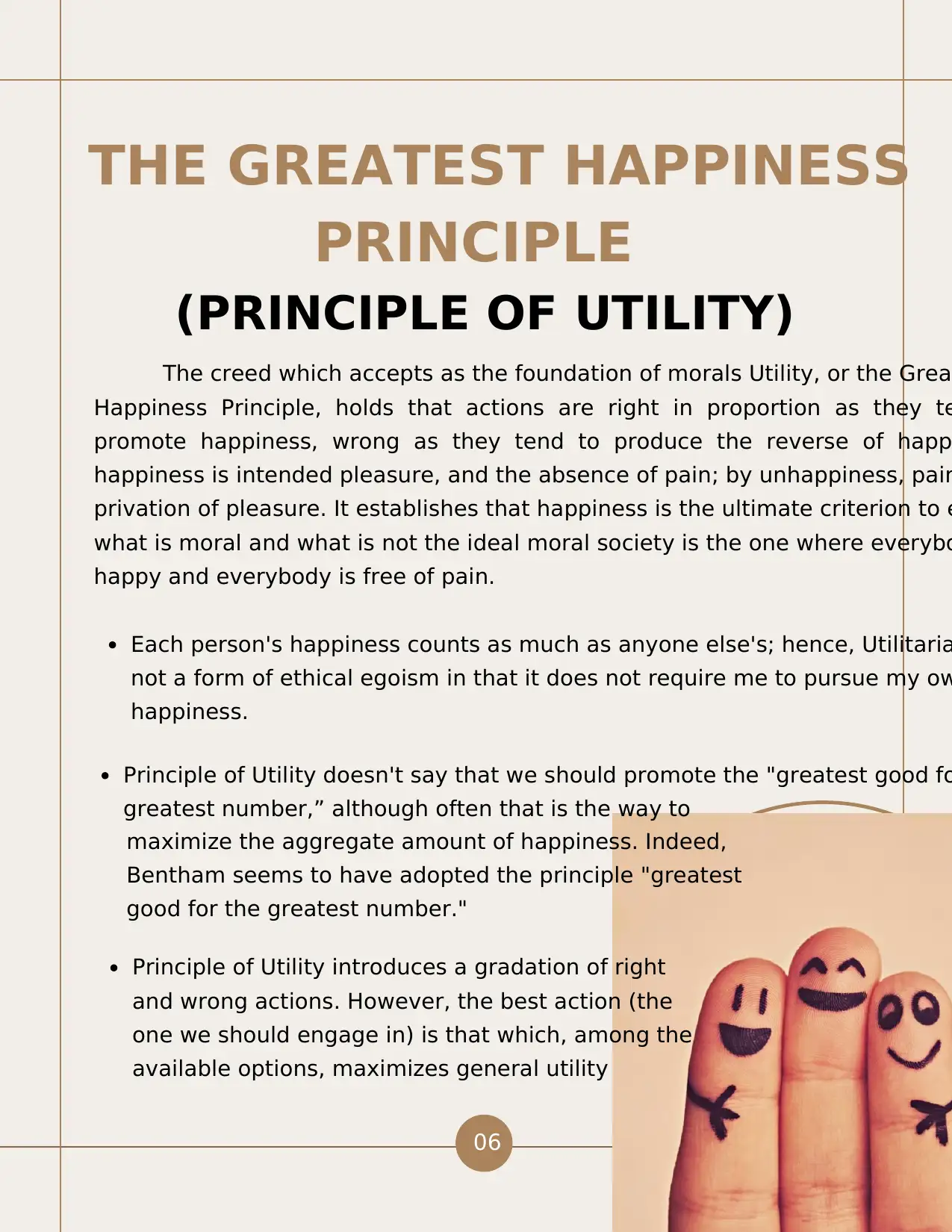
06
Each person's happiness counts as much as anyone else's; hence, Utilitaria
not a form of ethical egoism in that it does not require me to pursue my ow
happiness.
The creed which accepts as the foundation of morals Utility, or the Great
Happiness Principle, holds that actions are right in proportion as they te
promote happiness, wrong as they tend to produce the reverse of happ
happiness is intended pleasure, and the absence of pain; by unhappiness, pain
privation of pleasure. It establishes that happiness is the ultimate criterion to e
what is moral and what is not the ideal moral society is the one where everybo
happy and everybody is free of pain.
THE GREATEST HAPPINESS
PRINCIPLE
(PRINCIPLE OF UTILITY)
Principle of Utility introduces a gradation of right
and wrong actions. However, the best action (the
one we should engage in) is that which, among the
available options, maximizes general utility
Principle of Utility doesn't say that we should promote the "greatest good fo
greatest number,” although often that is the way to
maximize the aggregate amount of happiness. Indeed,
Bentham seems to have adopted the principle "greatest
good for the greatest number."
Each person's happiness counts as much as anyone else's; hence, Utilitaria
not a form of ethical egoism in that it does not require me to pursue my ow
happiness.
The creed which accepts as the foundation of morals Utility, or the Great
Happiness Principle, holds that actions are right in proportion as they te
promote happiness, wrong as they tend to produce the reverse of happ
happiness is intended pleasure, and the absence of pain; by unhappiness, pain
privation of pleasure. It establishes that happiness is the ultimate criterion to e
what is moral and what is not the ideal moral society is the one where everybo
happy and everybody is free of pain.
THE GREATEST HAPPINESS
PRINCIPLE
(PRINCIPLE OF UTILITY)
Principle of Utility introduces a gradation of right
and wrong actions. However, the best action (the
one we should engage in) is that which, among the
available options, maximizes general utility
Principle of Utility doesn't say that we should promote the "greatest good fo
greatest number,” although often that is the way to
maximize the aggregate amount of happiness. Indeed,
Bentham seems to have adopted the principle "greatest
good for the greatest number."
⊘ This is a preview!⊘
Do you want full access?
Subscribe today to unlock all pages.

Trusted by 1+ million students worldwide
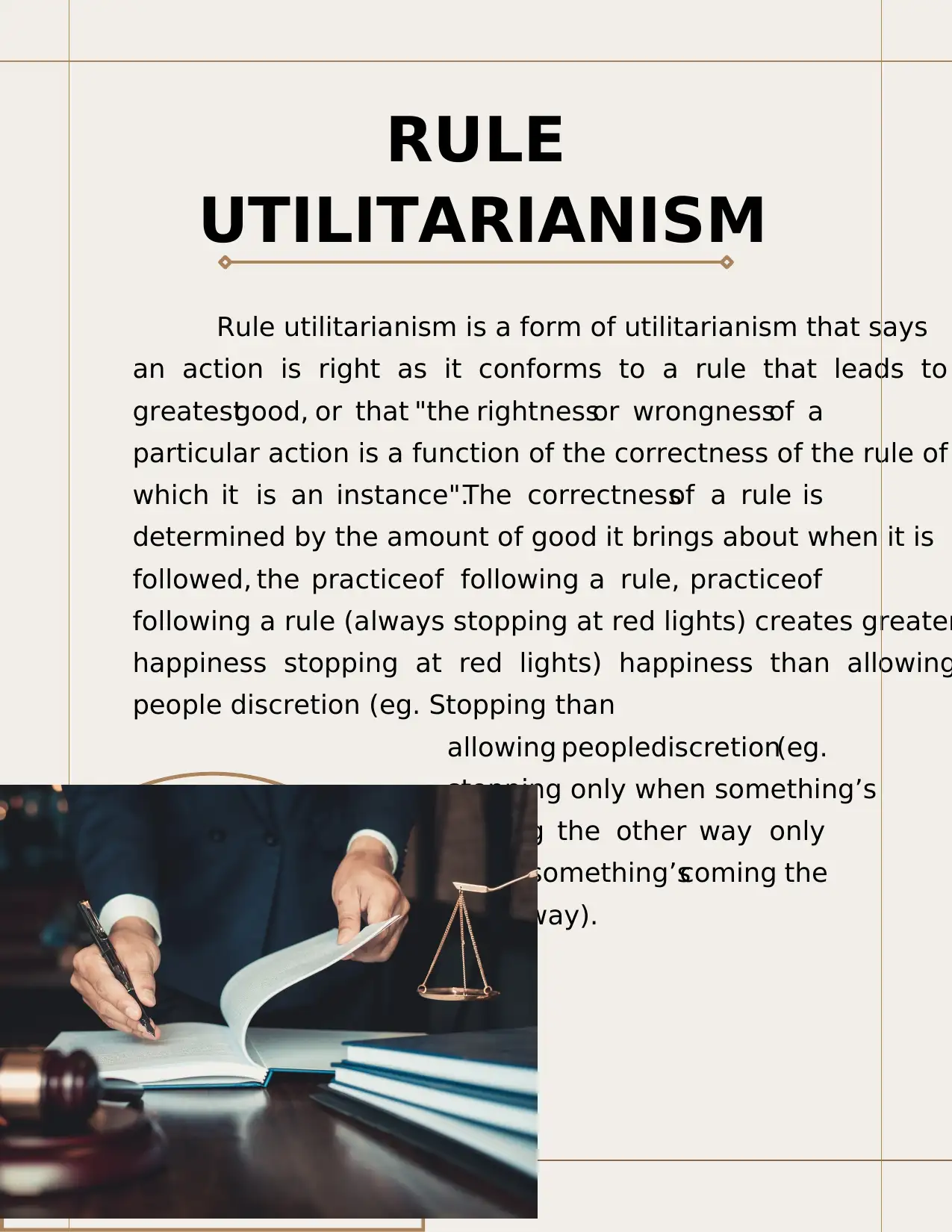
07
Rule utilitarianism is a form of utilitarianism that says
an action is right as it conforms to a rule that leads to
greatestgood, or that "the rightnessor wrongnessof a
particular action is a function of the correctness of the rule of
which it is an instance".The correctnessof a rule is
determined by the amount of good it brings about when it is
followed, the practiceof following a rule, practiceof
following a rule (always stopping at red lights) creates greater
happiness stopping at red lights) happiness than allowing
people discretion (eg. Stopping than
allowing peoplediscretion(eg.
stopping only when something’s
coming the other way only
when something’scoming the
other way).
RULE
UTILITARIANISM
Rule utilitarianism is a form of utilitarianism that says
an action is right as it conforms to a rule that leads to
greatestgood, or that "the rightnessor wrongnessof a
particular action is a function of the correctness of the rule of
which it is an instance".The correctnessof a rule is
determined by the amount of good it brings about when it is
followed, the practiceof following a rule, practiceof
following a rule (always stopping at red lights) creates greater
happiness stopping at red lights) happiness than allowing
people discretion (eg. Stopping than
allowing peoplediscretion(eg.
stopping only when something’s
coming the other way only
when something’scoming the
other way).
RULE
UTILITARIANISM
Paraphrase This Document
Need a fresh take? Get an instant paraphrase of this document with our AI Paraphraser
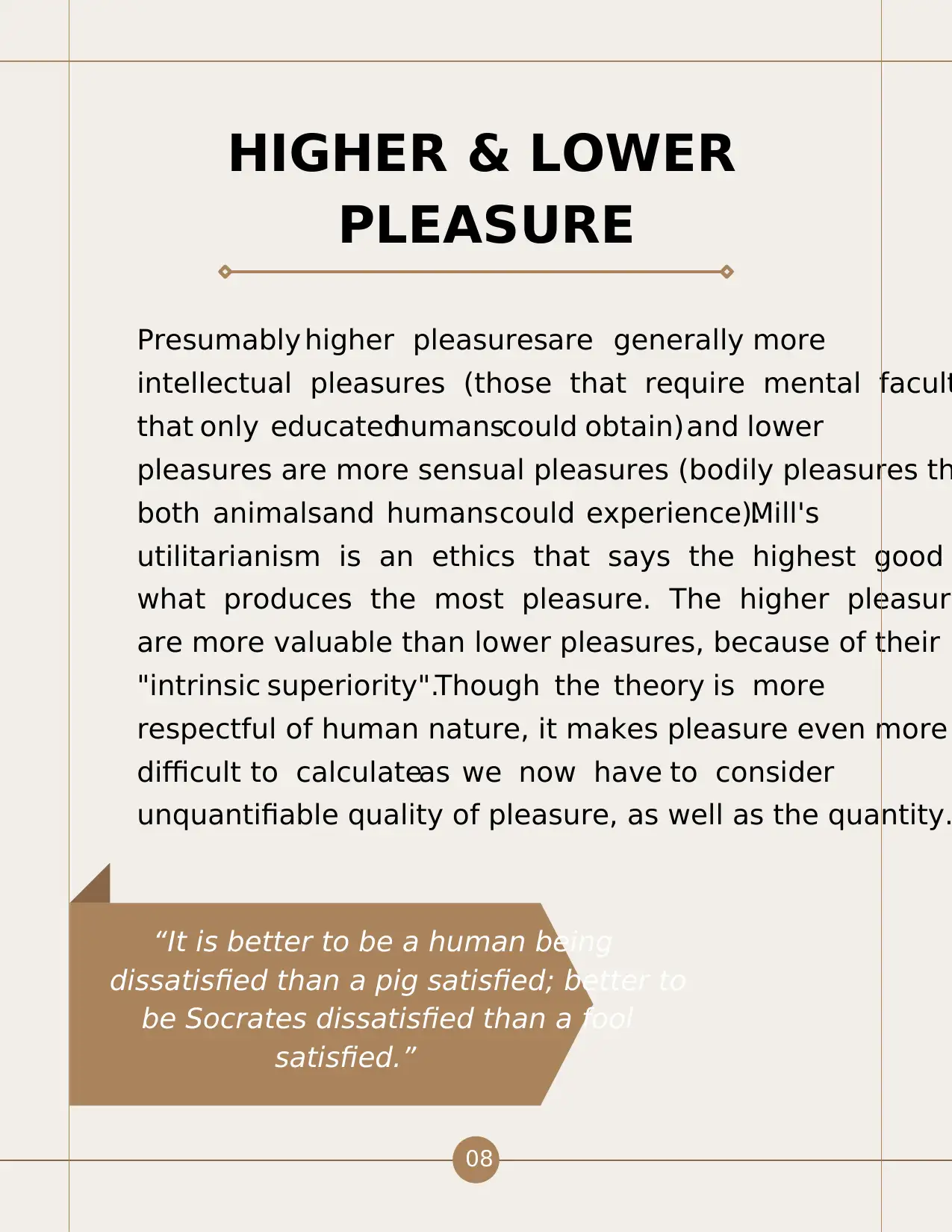
08
Presumably higher pleasuresare generally more
intellectual pleasures (those that require mental facult
that only educatedhumanscould obtain) and lower
pleasures are more sensual pleasures (bodily pleasures th
both animalsand humans could experience).Mill's
utilitarianism is an ethics that says the highest good
what produces the most pleasure. The higher pleasure
are more valuable than lower pleasures, because of their
"intrinsic superiority".Though the theory is more
respectful of human nature, it makes pleasure even more
difficult to calculateas we now have to consider
unquantifiable quality of pleasure, as well as the quantity.
HIGHER & LOWER
PLEASURE
“It is better to be a human being
dissatisfied than a pig satisfied; better to
be Socrates dissatisfied than a fool
satisfied.”
Presumably higher pleasuresare generally more
intellectual pleasures (those that require mental facult
that only educatedhumanscould obtain) and lower
pleasures are more sensual pleasures (bodily pleasures th
both animalsand humans could experience).Mill's
utilitarianism is an ethics that says the highest good
what produces the most pleasure. The higher pleasure
are more valuable than lower pleasures, because of their
"intrinsic superiority".Though the theory is more
respectful of human nature, it makes pleasure even more
difficult to calculateas we now have to consider
unquantifiable quality of pleasure, as well as the quantity.
HIGHER & LOWER
PLEASURE
“It is better to be a human being
dissatisfied than a pig satisfied; better to
be Socrates dissatisfied than a fool
satisfied.”
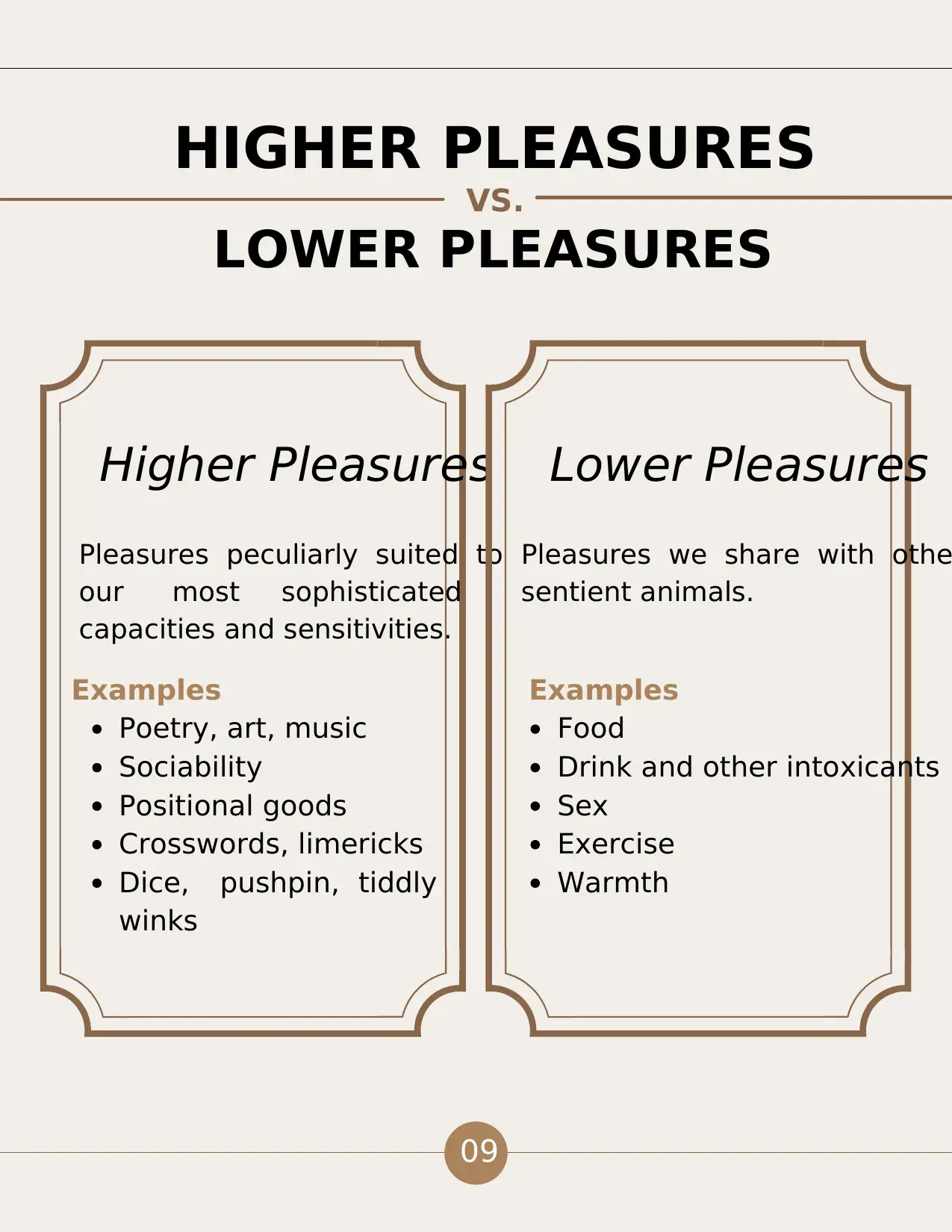
LOWER PLEASURES
VS.
09
HIGHER PLEASURES
Higher Pleasures
Pleasures peculiarly suited to
our most sophisticated
capacities and sensitivities.
Poetry, art, music
Sociability
Positional goods
Crosswords, limericks
Dice, pushpin, tiddly
winks
Examples
Lower Pleasures
Pleasures we share with othe
sentient animals.
Food
Drink and other intoxicants
Sex
Exercise
Warmth
Examples
VS.
09
HIGHER PLEASURES
Higher Pleasures
Pleasures peculiarly suited to
our most sophisticated
capacities and sensitivities.
Poetry, art, music
Sociability
Positional goods
Crosswords, limericks
Dice, pushpin, tiddly
winks
Examples
Lower Pleasures
Pleasures we share with othe
sentient animals.
Food
Drink and other intoxicants
Sex
Exercise
Warmth
Examples
⊘ This is a preview!⊘
Do you want full access?
Subscribe today to unlock all pages.

Trusted by 1+ million students worldwide
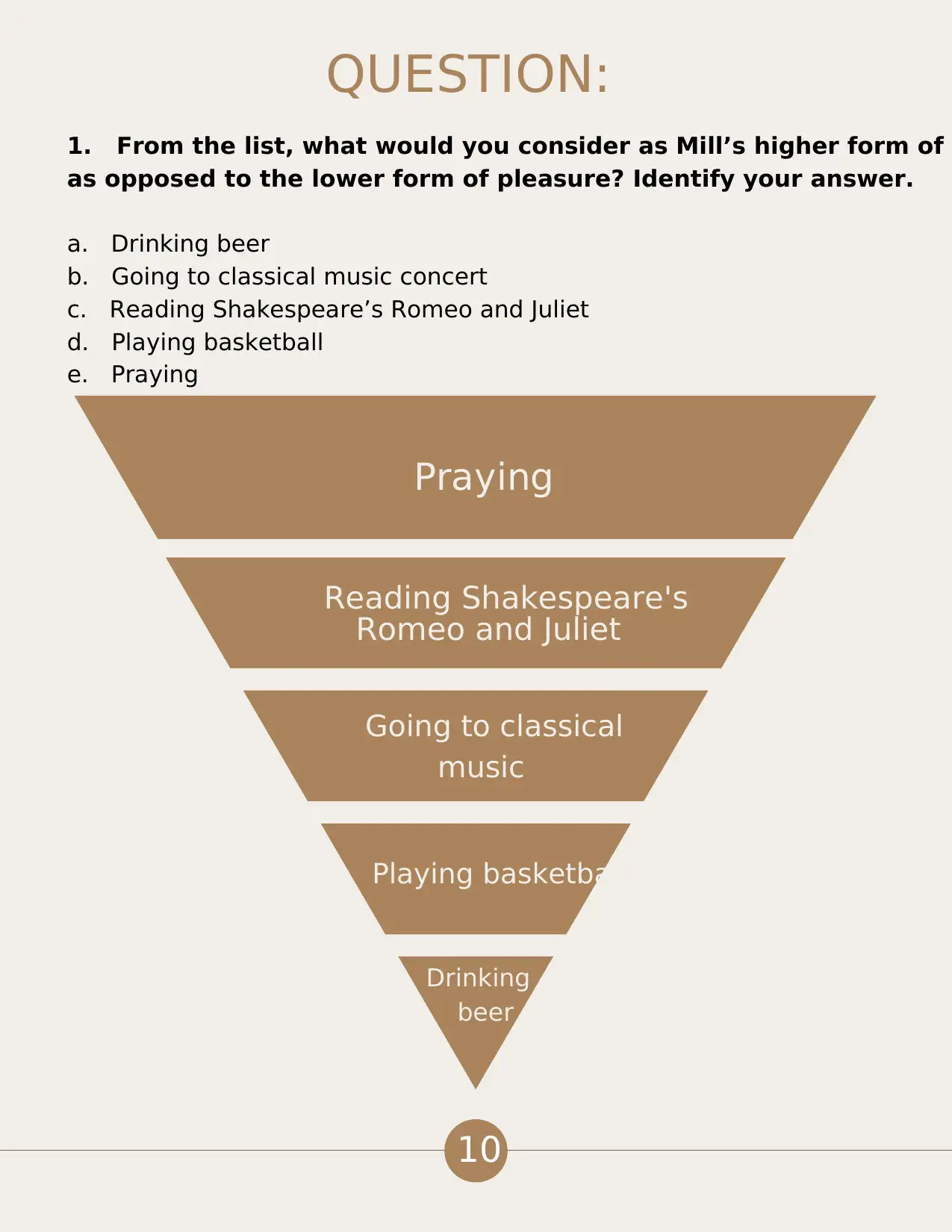
10
QUESTION:
1. From the list, what would you consider as Mill’s higher form of p
as opposed to the lower form of pleasure? Identify your answer.
a. Drinking beer
b. Going to classical music concert
c. Reading Shakespeare’s Romeo and Juliet
d. Playing basketball
e. Praying
Reading Shakespeare's
Romeo and Juliet
Going to classical
music
Playing basketball
Praying
Drinking
beer
QUESTION:
1. From the list, what would you consider as Mill’s higher form of p
as opposed to the lower form of pleasure? Identify your answer.
a. Drinking beer
b. Going to classical music concert
c. Reading Shakespeare’s Romeo and Juliet
d. Playing basketball
e. Praying
Reading Shakespeare's
Romeo and Juliet
Going to classical
music
Playing basketball
Praying
Drinking
beer
Paraphrase This Document
Need a fresh take? Get an instant paraphrase of this document with our AI Paraphraser
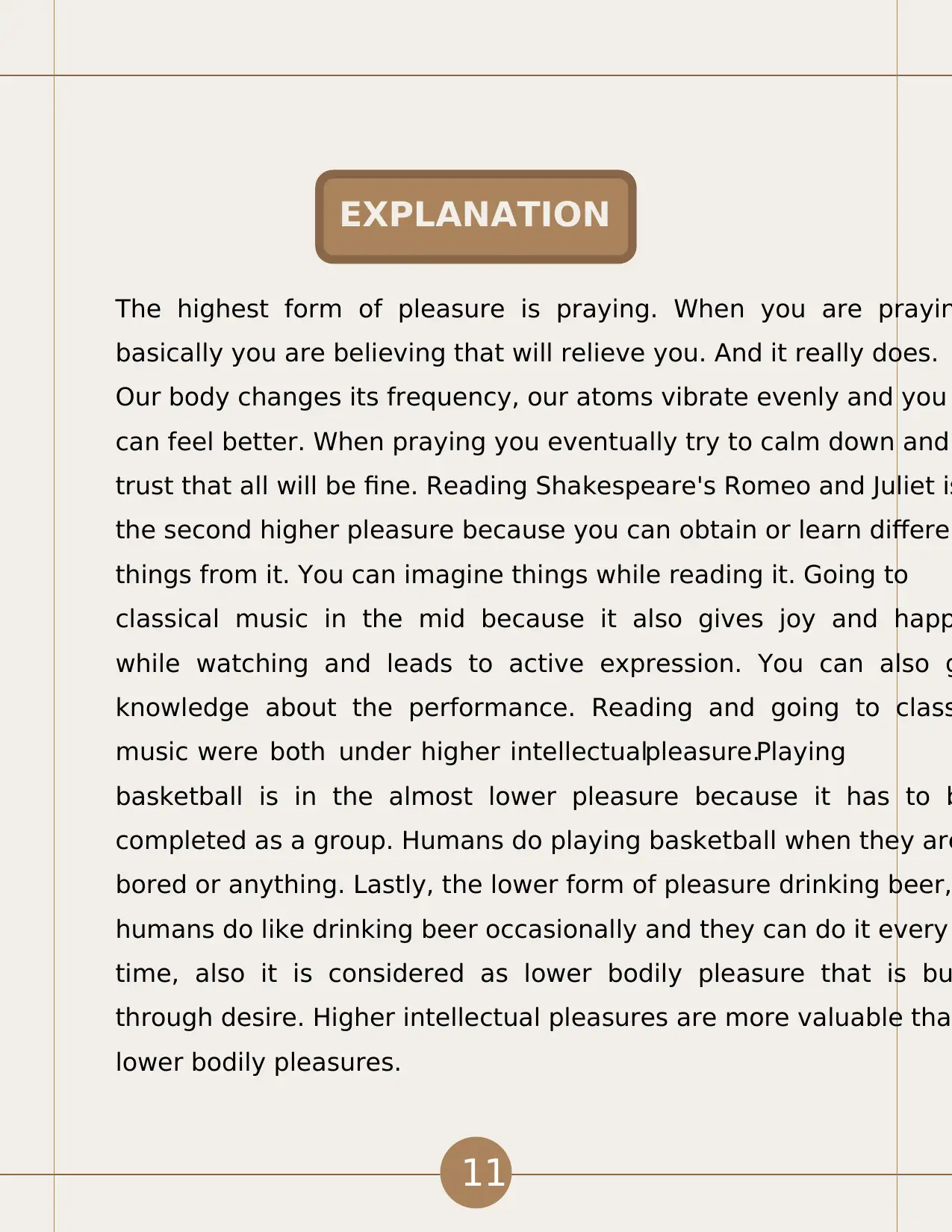
11
EXPLANATION
The highest form of pleasure is praying. When you are prayin
basically you are believing that will relieve you. And it really does.
Our body changes its frequency, our atoms vibrate evenly and you
can feel better. When praying you eventually try to calm down and
trust that all will be fine. Reading Shakespeare's Romeo and Juliet is
the second higher pleasure because you can obtain or learn differen
things from it. You can imagine things while reading it. Going to
classical music in the mid because it also gives joy and happ
while watching and leads to active expression. You can also g
knowledge about the performance. Reading and going to class
music were both under higher intellectualpleasure.Playing
basketball is in the almost lower pleasure because it has to b
completed as a group. Humans do playing basketball when they are
bored or anything. Lastly, the lower form of pleasure drinking beer,
humans do like drinking beer occasionally and they can do it every
time, also it is considered as lower bodily pleasure that is bu
through desire. Higher intellectual pleasures are more valuable than
lower bodily pleasures.
EXPLANATION
The highest form of pleasure is praying. When you are prayin
basically you are believing that will relieve you. And it really does.
Our body changes its frequency, our atoms vibrate evenly and you
can feel better. When praying you eventually try to calm down and
trust that all will be fine. Reading Shakespeare's Romeo and Juliet is
the second higher pleasure because you can obtain or learn differen
things from it. You can imagine things while reading it. Going to
classical music in the mid because it also gives joy and happ
while watching and leads to active expression. You can also g
knowledge about the performance. Reading and going to class
music were both under higher intellectualpleasure.Playing
basketball is in the almost lower pleasure because it has to b
completed as a group. Humans do playing basketball when they are
bored or anything. Lastly, the lower form of pleasure drinking beer,
humans do like drinking beer occasionally and they can do it every
time, also it is considered as lower bodily pleasure that is bu
through desire. Higher intellectual pleasures are more valuable than
lower bodily pleasures.
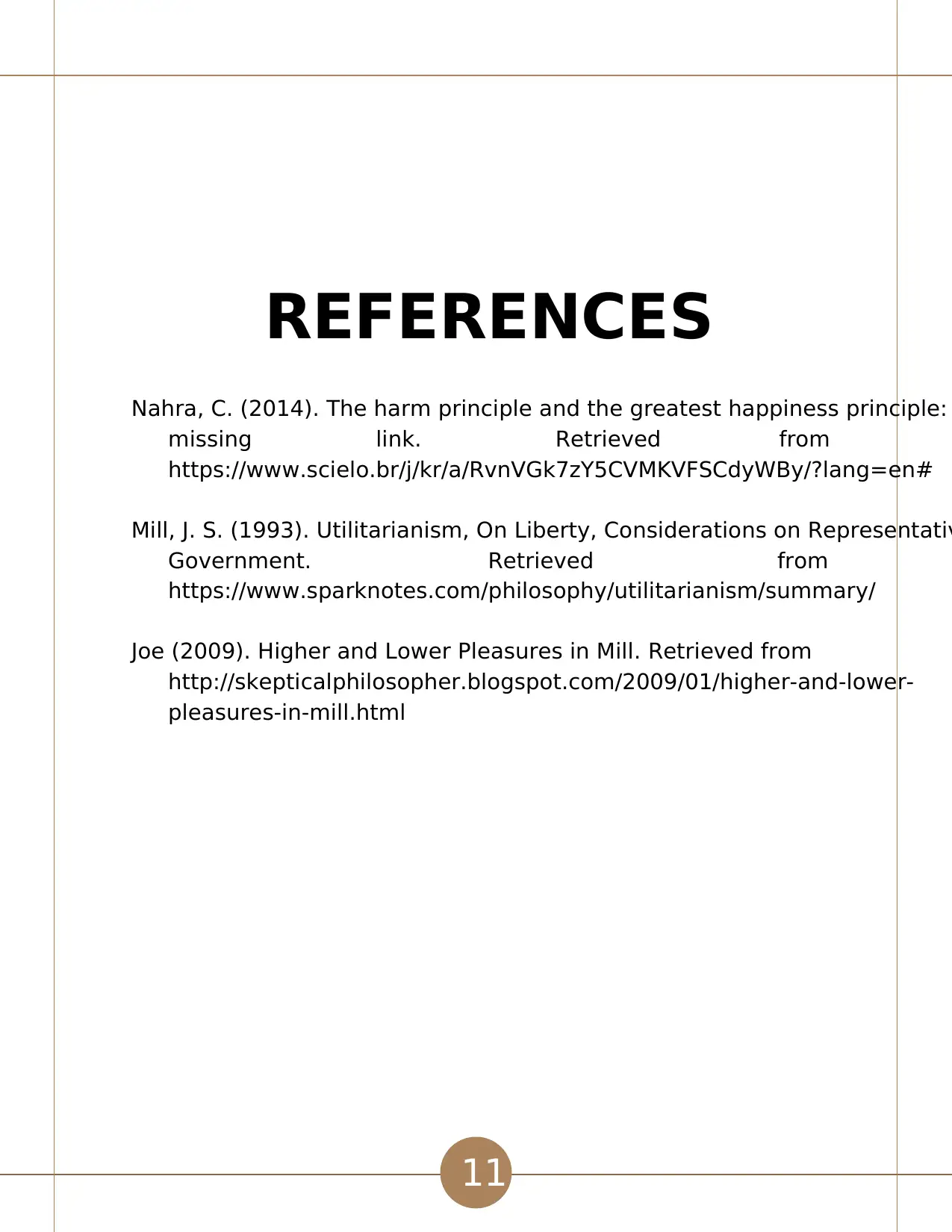
REFERENCES
11
Nahra, C. (2014). The harm principle and the greatest happiness principle:
missing link. Retrieved from
https://www.scielo.br/j/kr/a/RvnVGk7zY5CVMKVFSCdyWBy/?lang=en#
Mill, J. S. (1993). Utilitarianism, On Liberty, Considerations on Representativ
Government. Retrieved from
https://www.sparknotes.com/philosophy/utilitarianism/summary/
Joe (2009). Higher and Lower Pleasures in Mill. Retrieved from
http://skepticalphilosopher.blogspot.com/2009/01/higher-and-lower-
pleasures-in-mill.html
11
Nahra, C. (2014). The harm principle and the greatest happiness principle:
missing link. Retrieved from
https://www.scielo.br/j/kr/a/RvnVGk7zY5CVMKVFSCdyWBy/?lang=en#
Mill, J. S. (1993). Utilitarianism, On Liberty, Considerations on Representativ
Government. Retrieved from
https://www.sparknotes.com/philosophy/utilitarianism/summary/
Joe (2009). Higher and Lower Pleasures in Mill. Retrieved from
http://skepticalphilosopher.blogspot.com/2009/01/higher-and-lower-
pleasures-in-mill.html
⊘ This is a preview!⊘
Do you want full access?
Subscribe today to unlock all pages.

Trusted by 1+ million students worldwide
1 out of 12
Related Documents
Your All-in-One AI-Powered Toolkit for Academic Success.
+13062052269
info@desklib.com
Available 24*7 on WhatsApp / Email
![[object Object]](/_next/static/media/star-bottom.7253800d.svg)
Unlock your academic potential
Copyright © 2020–2026 A2Z Services. All Rights Reserved. Developed and managed by ZUCOL.





